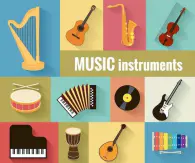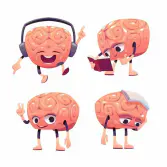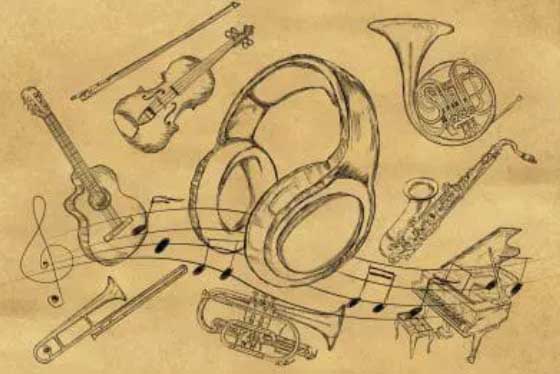For teachers
Benefits of Learning Musical Instruments
Music has been a part of human culture for centuries, and musical instruments have played a crucial role in its creation and performance.
From classical symphonies to modern pop songs, musical instruments have allowed people to express themselves and connect with others through the beauty of sound.

And who said musical instrument were just kid stuff? Just because musical instruments were the domains of our childhoods doesn’t mean that adults can’t reap the benefits of learning music from a musical instrument.
Taking up a musical instrument as an adult provides numerous mental, physical and emotional advantages – so it’s never too late to enter into the amazing world of musical instruments!
From increased cognitive skills and improved memory to better heart health and stress reduction – there are countless reasons why a bit of musical training practice can be extremely beneficial. Plus, you get to share your cool new skills with friends and family at awesome jam sessions.
In this article, we will explore the numerous benefits of learning musical instruments and having music lessons, both for individuals and society as a whole.
Memory Skills

- Improved memory and concentration: Learning to play musical instruments requires a great deal of focus and concentration, as well as memorization of music pieces and techniques.This can lead to improve memory skills and attention to detail, which can be applied to other areas of life.
- Memory is something we all strive to improve, especially when it comes to studying for the big test. With that in mind, musical instruments can be a great way to naturally exercise your brain and help you with developing better memory skills.
- Musical Creativity With a musical instrument, you can create music from your own imagination—an incomparable benefit.

Not only do musical instruments force you to engage with musical theory and the basics of musical composition, they also increase retention power and practice concentration.
The process of learning musical instruments requires committed repetition – this helps create stronger neural pathways in the brain and strengthens our ability to store memories.
Mental and Emotional Health Benefits
One of the most significant benefits of learning musical instruments is the positive impact they have on mental health and emotional health.
Research has shown that playing a musical instrument can have a therapeutic effect, reducing blood pressure, stress, anxiety, and depression.

This is because the act of playing an instrument triggers the release of endorphins, which are natural painkillers and mood enhancers.
- Emotional benefits: Music is a powerful tool for expressing emotions, and playing an instrument can be a great way to release feelings and connect with others.For some, playing music can also be a source of comfort and relaxation, helping to reduce stress and anxiety.
- Music and mental health have always gone hand in hand, with musical instruments playing their part in driving positive emotions. Playing musical instruments can reduce stress and relieve anxiety, as well as improve moods.They are great tools for self-expression and creative outlets, allowing us to say things that we can’t necessarily say aloud. It is also believed that musical engagement helps the brain to override negative thoughts and promote feelings of hopefulness.Stimulating our musical abilities even has further benefits, such as enhancing cognitive functions like visuospatial processing – which involves mental imaging like reading musical notation or body movement like playing a musical instrument.Ultimately, benefits of learning musical instruments offer a source of comfort, help to manage emotions and give us a way to boost our physical health and mental wellbeing!
Educational Benefits

Playing a musical instrument can also have a significant educational benefits on children. Learning a musical instrument requires discipline and dedication, teaching individuals important life skills such as patience, perseverance, and goal-setting which will eventually lead to academic success.
In addition, playing an instrument can also improve skills such as coordination, motor skills, problem-solving skills, and critical thinking.
This is because playing an instrument involves not just physical coordination but also cognitive coordination, as the player must read music, interpret it, and translate it into sound.
- Increased self-confidence: Learning to play a musical instrument can help boost self-confidence and self-esteem. As individuals progress and develop their skills, they can feel proud of their accomplishments and gain a sense of pride and purpose.
- Improved hand-eye coordination: Learning to play an instrument requires coordination between the hands, eyes, and ears. This can help improve hand-eye coordination, which can transfer to other areas of life, such as sports or even typing.
- Better teamwork and communication skills: Many musical instruments are designed to be played in groups, requiring musicians to work together and communicate effectively. This can help individuals develop teamwork and communication skills that can be applied in other areas of life.
Social Benefits
Music is a universal language, and playing an instrument can bring people together, regardless of age, culture, or background. Whether it’s playing in a band, joining a choir, or simply playing with friends, benefits of learning musical instruments can foster a sense of community and belonging.

In addition, playing an instrument can also improve communication skills and social skills and build confidence. By performing in front of an audience, individuals can develop their public speaking and presentation skills, as well as their ability to work with others and collaborate effectively.
Cultural enrichment

Music is a universal language and can be a powerful tool for bringing people together. Learning an instrument and studying different musical styles and traditions can provide a deeper understanding and appreciation of different cultures, as well as a sense of belonging to a global community.
Career opportunities

For those interested in a career in music, learning an instrument is an essential first step. However, even those who do not pursue music as a profession can benefit from the skills they develop through musical education, such as critical thinking, comprehension skills. time management skills, creativity, and teamwork, which can be applied to many other fields.
In conclusion, learning to play a musical instrument has a wide range of benefits for individuals and society as a whole.
From improved cognitive and emotional well-being to increased creativity and cultural enrichment, there are many reasons why everyone should consider picking up an instrument and giving it a try.
Whether you’re looking to become a professional musician or simply looking for a new hobby, playing an instrument is a rewarding and fulfilling experience that can bring joy and enrichment to your life.








